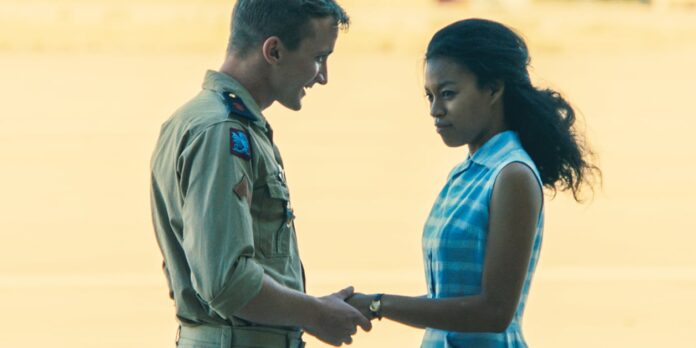“When a white person sleeps, we breathe better,” says Miangaly, a young man who is in a relationship with Bernard, a French soldier sent to Madagascar in the early 1970s. She speaks in Malagasy to Andry, whom Bernard introduced as “his brother ”. , and the masks fall. There is a before and after this sentence in Red Island by Robin Campillo, director of 120 beats per minuteCésar for best film of 2018.
Ivato Military Base 181
Initially, the French director, born in 1962 in Mohammedia (Morocco), develops a family chronicle inspired by a true story. “My father was a non-commissioned officer in the French Air Force. My parents, my brothers and I were born in Morocco and later lived in Algeria. Our last destination was military base 181 in Ivato, in Madagascar”, he confides. The events unfold before the eyes of Thomas, a fascinated child. per Fantômettecharacter in soap operas for young people.
From the popular heroine in France from the 1960s to the 1980s, the curious boy is inspired by his penetrating look at situations and people, to scrape off the veneer of appearances. Thus, Thomas hides in a rat hole when the couples around him fall apart, some openly, others insidiously: “What I tried to do was put my memories into perspective, not to find a historical or autobiographical truth, but rather to create a sensorial world, that of Thomas. A nascent consciousness that discovers things without fully understanding them. »

Charlie Vauselle plays the character Thomas in “The Red Island”. © Gilles Marchand
This awakening of the senses gives a false rhythm to the Red Island,a languor different from the frenzy of 120 beats per minute. The action also happens off-screen, as when Odile, nostalgic for France, leaves her husband Bernard. We only find out when he appears with Miangaly at a Christmas party. This union arouses murmurs, disapproval and worse: a priest exorcises the young man to keep him away from the devil.
Impossible mixed couple
This impossible couple is the clear manifestation of what Robin Campillo had already suggested by the virtual absence of the Malagasy people in the lives of the French. For most of the film, they appear at the end of the telescope. From the first scene, a Malagasy housekeeper who wants to clean a garden hose is discreetly ordered to leave during a meal with friends.
A disconnection explained by the director: “Throughout almost the entire film, the Malagasy [Malgaches] are like extras that we barely see. They are present at school, at church, on the streets of the base military, but we don't pay attention to them. The film thus reproduces the cruelty of colonization. »
And then there's this scene where the film shifts to the aftermath. The day before his family left for France, Thomas, dressed in Fantômette, spies on the couple Bernard and Miangaly. Bernard insists that a young man follows him to France, but she refuses. The man is drunk and confuses love with possession. The colonial metaphor is obvious. It takes the intervention of Andry, Bernard's “brother”, to prevent a dangerous descent into violence. Bernard faints from exhaustion and Miangaly utters this sentence: “When a white person sleeps, we breathe better. »
Finally protagonists of your story
A young man regains his language and freedom of expression. The last quarter of an hour is in Malagasy, and the Malagasy people who until then were extras “become protagonists of the film and especially of their own story”.
We then discussed, in situations that we will not reveal, social inequalities, the persistent teaching of French, the speech of Joseph Gallieni, general and governor-general of Madagascar from 1896 to 1905, justifying his “racial policy” and the bloody repression that took place. to the 1947 Revolution. insurrection – particularly the Moramanga massacre.
Robin Campillo offers almost two films in one, a family chronicle and then a political manifesto. Avoid the nostalgia trap by revealing the socio-historical context behind the smiles imposed on French soldiers and their loved ones. They struggle to play a role in their family. These pretensions propelled them into a headlong rush similar to the illusion that occurred in the years of colonial rule after independence.

© Souvenir distribution
Red Island, by Robin Campillo, in theaters on 31 It could 2023

